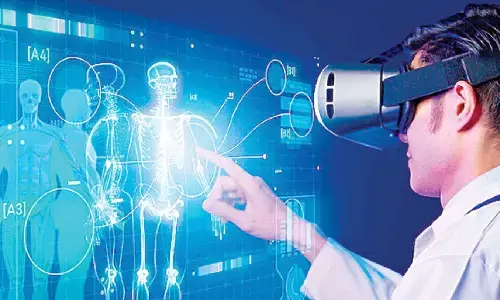Technology trends influencing higher education

Representational image
Over the years, technology has been evolving and creating innovations in almost all industries
Over the years, technology has been evolving and creating innovations in almost all industries. The impact is visible in the education industry as well. The universe of education continues to grow with the manifold transformations resulting from the Covid-induced digital revolution.
In today's globalising world, the pedagogical pattern has changed and it has become imperative for educators and students to keep abreast with the latest technological changes impacting hybrid culture. In continuation to this, many online platforms and tech trends are emerging and shaping the future of higher education in India.
Remote learning
Remote learning is lifted as the most significant part of education, especially post-covid. It has helped urban and rural students learn from anywhere and also enabled poised working professionals to come out of the metaphorical box of education and opt for higher studies through easily accessible online classes. Recently, the government introduced programmes like the PM eVIDYA programme, DIKSHA and others to boost the best global online education practices in India.
AI in education
Artificial intelligence is playing an increasingly important role in higher education. Technologies like augmented and virtual reality in the classroom make learning more fun and empirical. Now students get a chance to learn differently by living the text, statistics, and stories in the virtual world.
AI-powered tools like plagiarism detection, chatbots for enrollment and retention, learning management systems, transcription of faculty lectures, analyzing student success metrics, academic research, etc. are being used in higher education. A Business Standard report reveals that by 2024, 47 per cent of learning management tools will be AI-enabled. Also, AI helps teachers see what is happening in a classroom in real-time, automate activities like multiple choice questions, fill in the blanks, and report cards, which are otherwise a tedious task for teachers to prepare. AI can simplify the process, helping educators personalize learning experiences and tailor content to individual students.
Robust teaching
To meet the demands of today's students, teachers need to be more robust in their teaching skills and adapt to the newer patterns of teaching systems. This means using a variety of digital teaching techniques and having a deep conceptual understanding with faster and more accurate procedural fluency to address the needs of each student.
E-books
The traditional text book culture is an evergreen criterion in students' lives. However, the prolonged unavailability of physical books in the market due to the Covid-19-led lockdown has led to an uptake of eBooks and audiobooks in India. Audiobooks are one of the evolving education trends in Indians considering they are a lot more convenient, available for use anywhere, and flexible for the listeners.
The upsurge of hybrid learning:
Online learning is becoming increasingly popular as it offers students a flexible and convenient way to study. More and more people are choosing to study online, as it allows them to fit their studies around other commitments. Online learning is also becoming more affordable, as there are no travel or accommodation costs involved.
The rise of online learning is impacting the higher education sector positively, as it is making education more accessible to people who would otherwise be unable to attend traditional universities. Moreover, it is benefiting employers, as it allows them to upskill their employees without having to send them away from work for longer practical trainings.
Experiential learning
Hands-on learning is an emerging trend in higher education.It indicates that students are not just learning theoretical concepts but also gaining practical knowledge in their fields. It is trending because it enables students to apply their knowledge in a practical situation, particularly in industries like engineering and healthcare. For instance, students need to comprehend and apply medical principles in a clinical setting, and students in engineering need to plan and construct projects that function in the real world.
Hands-on learning is budding for a number of reasons, like employers seeking graduates with real-world experience in their fields. Another justification is that it improves pupils' memories. Overall, the move toward experiential learning is benefiting higher education.
Conclusion
It is evident that the higher education landscape will continue to change and evolve in the coming years. With new technologies and trends emerging, there will be new opportunities and challenges for both students and institutions alike. However, by staying informed and adaptable, we can all ensure that we are best positioned to take advantage of the changes ahead.
(The author is Chancellor - DY Patil University, Navi Mumbai and an Educationist, an Entrepreneur and Sports Enthusiast)










